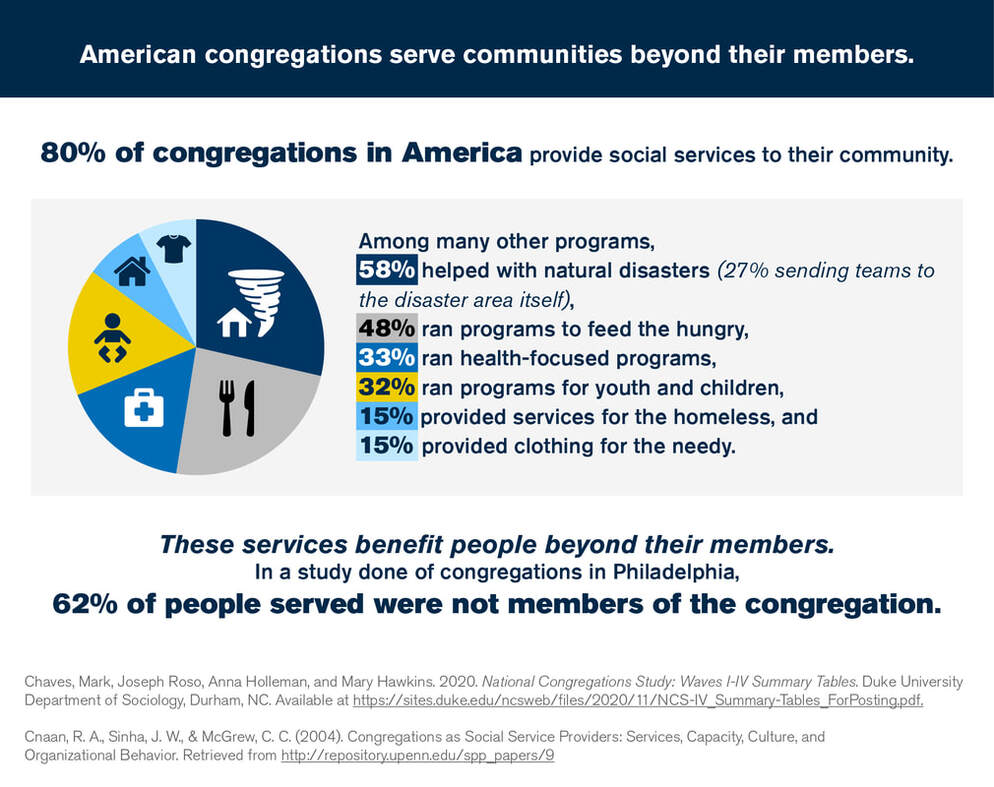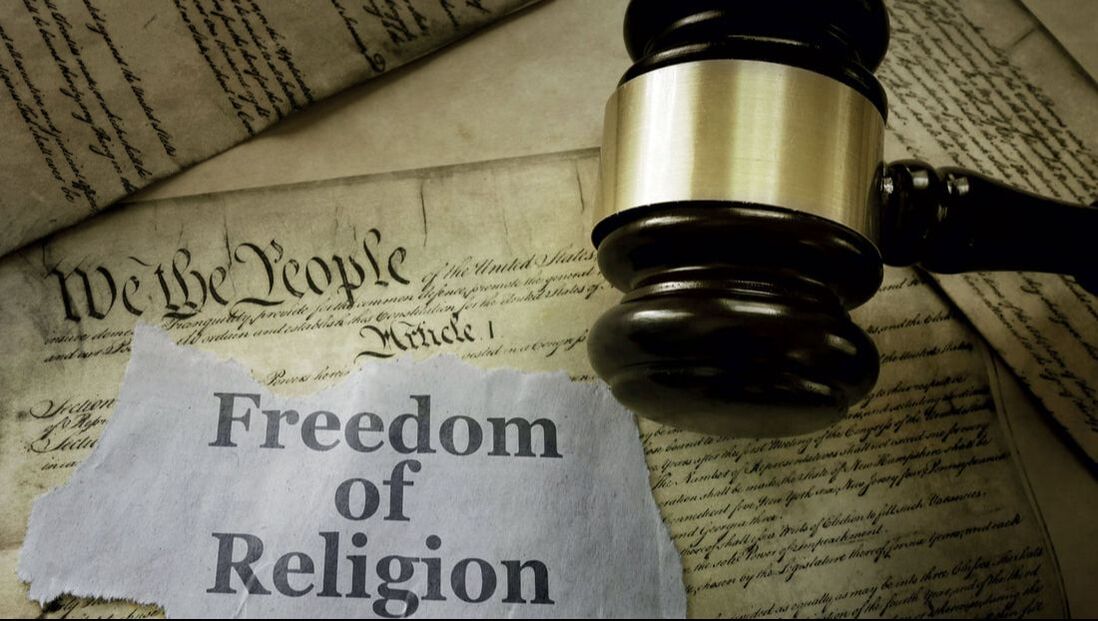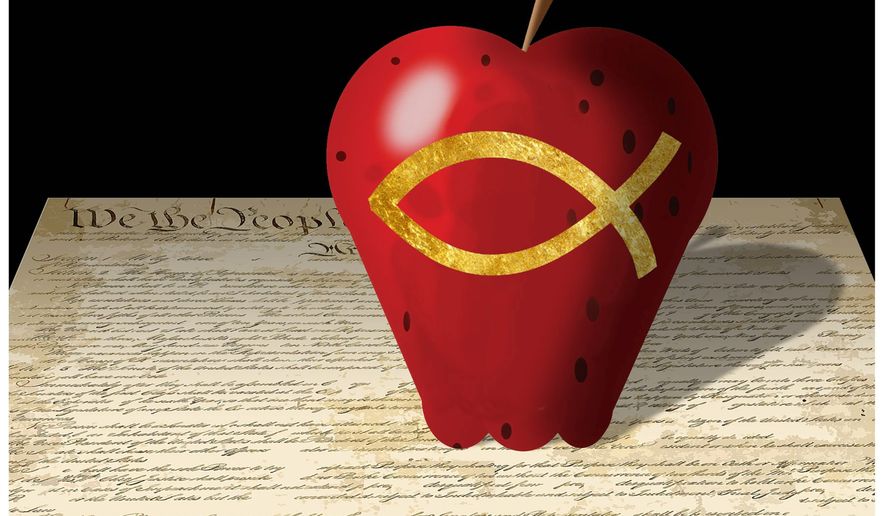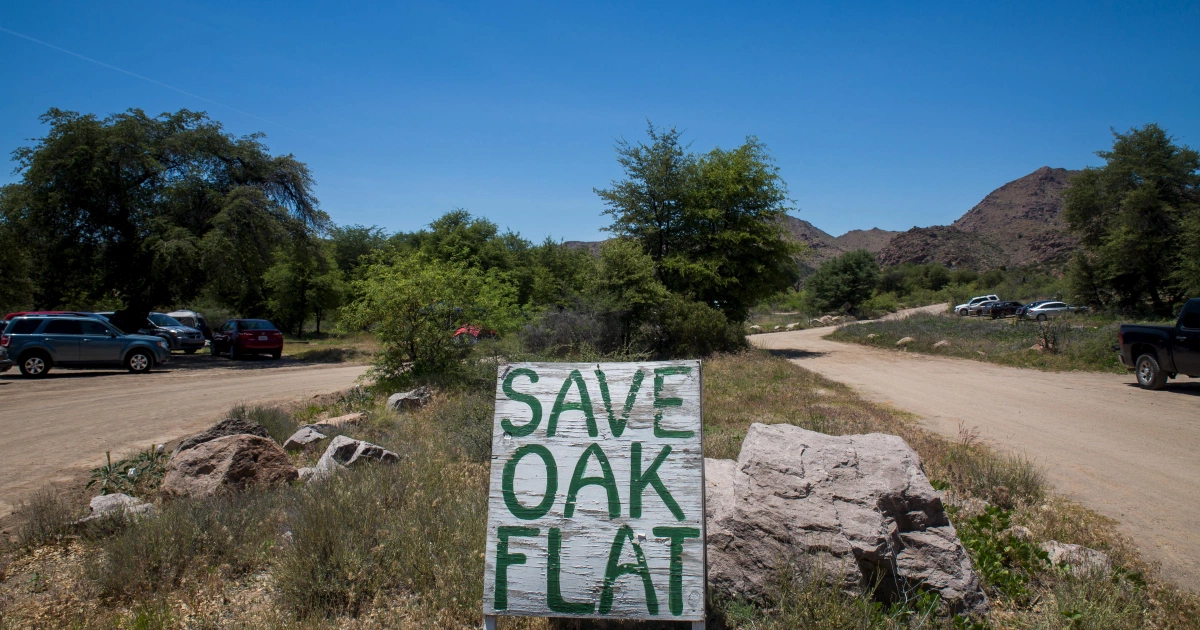|
What does love look like? It has the hands to help others. It has the feet to hasten to the poor and the needy. It has eyes to see misery and want. It has the ears to hear the sighs and sorrows of men. That is what love looks like. - Augustine, Confessions The Becket law firm combined data from the National Congregations study of churches, synagogues and mosques at Duke University with an earlier study from the University of Pennsylvania on congregations as service providers.
They show that 80 percent of congregations provide social services to their communities. As important as government safety net programs are, without the continuous care from religious organizations and houses of worship, millions of people would fall through the cracks. Religious congregations are there when a hurricane sweeps through or an earthquake destroys homes and jobs. They cook meals and man the food lines for the homeless and the hungry. They run programs that advance health and promote the welfare of the young. When these services are provided, houses of worship often provide them within their own walls. Churches, synagogues, and mosques are not just places where worship services are held. They are places where people in need are served. This is one reason why Protect The 1st is adamant about protecting the free exercise of religion clause in the First Amendment. Protecting the right to worship is also protecting human welfare. Charity is not just a side gig for religious organizations. In many instances, it is the practice of religion itself.
This principle came into stark relief when a July 28 executive order issued by Texas Governor Greg Abbott sparked a legal battle with the federal government, catching a Catholic charity in the middle. At stake is the ability of religious organizations to practice faith in charitable action – while executing a mission that ought to be of great value to the State of Texas. Gov. Abbott issued his order after reports about a maskless migrant family at a restaurant in La Joya, Texas. The family was supposed to be under quarantine at a nearby hotel after some of its members tested positive for COVID-19. The governor echoed statewide concerns about the influx of migrants and a spike in COVID-19 cases, citing a 900 percent increase in COVID-positive migrants detained by federal officials in the Rio Grande Valley. The order prohibits group vehicle transport of migrants by private entities, backed by a threat to confiscate vehicles. The order would shut down the work of Catholic Charities of the Rio Grande Valley (CCRGV), which provides families, pregnant mothers, single women and others with food, medical care and shelter from the hot Texas sun. Under the order, CCRGV could not shuttle migrants from its Humanitarian Respite Center, where migrants are legally dropped off by Customs and Border Patrol, to appropriate destinations. Those who test negative are either admitted to the shelter or shuttled by the charity to other destinations while they await their hearings. Those who test positive are shuttled to one of several hotels contracted by Catholic Charities (or other sites identified by government officials), where they quarantine along with their families. Two days after Gov. Abbott signed his executive order, the Department of Justice filed suit to block it and issued an emergency request to stop its enforcement. The federal government argues the order would jeopardize the health and safety of noncitizens in federal government custody – along with federal law enforcement personnel, their families and others in Texas border communities. CCRGV contends that the order threatens daily operations and wrongfully endangers its religious mission to provide migrants with food, water, medical care, and a place to briefly rest. Sister Norma Pimentel: “Serving those in need, and especially those we serve through the Humanitarian Respite Center, is part of our sincere religious exercise as Catholics.” The Becket law firm filed an amicus brief on behalf of CCRGV, supporting the Justice Department’s legal challenge and arguing that the order harms immigrants, increases the community spread of COVID-19, and restricts religious exercise protected under the First Amendment. “Immigration, border security and COVID-19 are hard issues without easy answers. But shutting down this ministry will make it harder, not easier to deal with those problems,” said Becket attorney Lori Windham. The U.S. District Court for the Western District of Texas in El Paso issued a temporary restraining order on August 13, allowing Catholic Charities to continue its mission. Sister Norma Pimentel, who leads the nonprofit, said she remains deeply concerned that the governor’s order will worsen the COVID-19 crisis and have a negative impact on migrant families and others in the region. “Serving those in need, and especially those we serve through the Humanitarian Respite Center, is part of our sincere religious exercise as Catholics,” Pimentel said. The court must now decide whether to issue an injunction against the executive order while the Justice Department’s case against the State of Texas is pending. Protect The 1st supports the right of CCRGV to express its faith through good works. We applaud Becket’s work on the nonprofit’s behalf. Governor Abbott is right to be concerned about the rapid increase in COVID-19 cases, but his good intentions inadvertently compromise the charitable practice of religion and could have a boomerang effect on preventing the spread of infection. The Department of Justice recently made a very public edit in a brief before a federal court in Oregon that weakened its standard for the protection of religious freedom.
Government lawyers had previously declared to the court that it would “vigorously” defend religious freedom. A day after its filing, Department of Justice lawyers submitted a revised brief that omitted “vigorously” and promised instead to be “adequate” in protecting religious freedom. Ken Marcus, founder and chairman of The Louis D. Brandeis Center for Human Rights Under Law, writes about this Oregon case regarding an attempt to remove the exemption that religious colleges enjoy in federal regulation. The Apache Stronghold’s struggle to save its sacred lands at Oak Flat in the Tonto National Forest has won a new ally – one that would have everything to lose if the proposed copper mine is the jobs bonanza promoters promise.
Karla Schumann, Teamsters Local Union 104 Secretary Treasurer, recently wrote on behalf of the 8,400 Teamsters Local Union 104 members, endorsing Rep. Raul Grijalva’s Save Oak Flat Act, H.R. 1884. Since time immemorial, Native Americans have gone to Oak Flat to participate in ceremonies, to pray, to gather medicines and ceremonial items. and to seek and obtain peace and personal cleansing … Rio Tinto, BHP and Resolution Copper seek to extract the copper ore beneath Oak Flat using the block-cave or panel-cave mining method. This will cause the surface of Oak Flat to collapse and result in a 1.8-mile-wide crater, which is the approximate distance from the Capitol to the Lincoln Memorial, that will be over a thousand feet deep. The process will permanently destroy more than one dozen sacred springs, burial sites and related cultural properties. What about the promised jobs the project would bring? Surely the Teamsters are alert to new prospects with good-paying jobs? Proponents of the mine claim job creation as the primary reason to move forward with the project … this mine will be fully automated and will not create good jobs for Arizonians. Resolution Copper will utilize robotized drilling and automated haul trucks that can all be controlled from an operations center outside of Arizona. Bottom line: A union that represents working men and women says there is not much of an upside from an employment perspective in the copper mine – and a huge downside for the government’s respect for religious liberty. Written by Protect the 1st's Senior Policy Advisors, Bob Goodlatte and Rick Boucher.
"Recent reports reveal the Department of Justice issued secret orders to surveil — take your pick — the private communications of journalists, a White House counsel, and at least two members of Congress. For all the political furor about the latter, we should not overlook how serious the threat to civil liberties becomes when the government spies on journalists." |
Archives
June 2024
Categories
All
|
ABOUT |
ISSUES |
TAKE ACTION |






 RSS Feed
RSS Feed